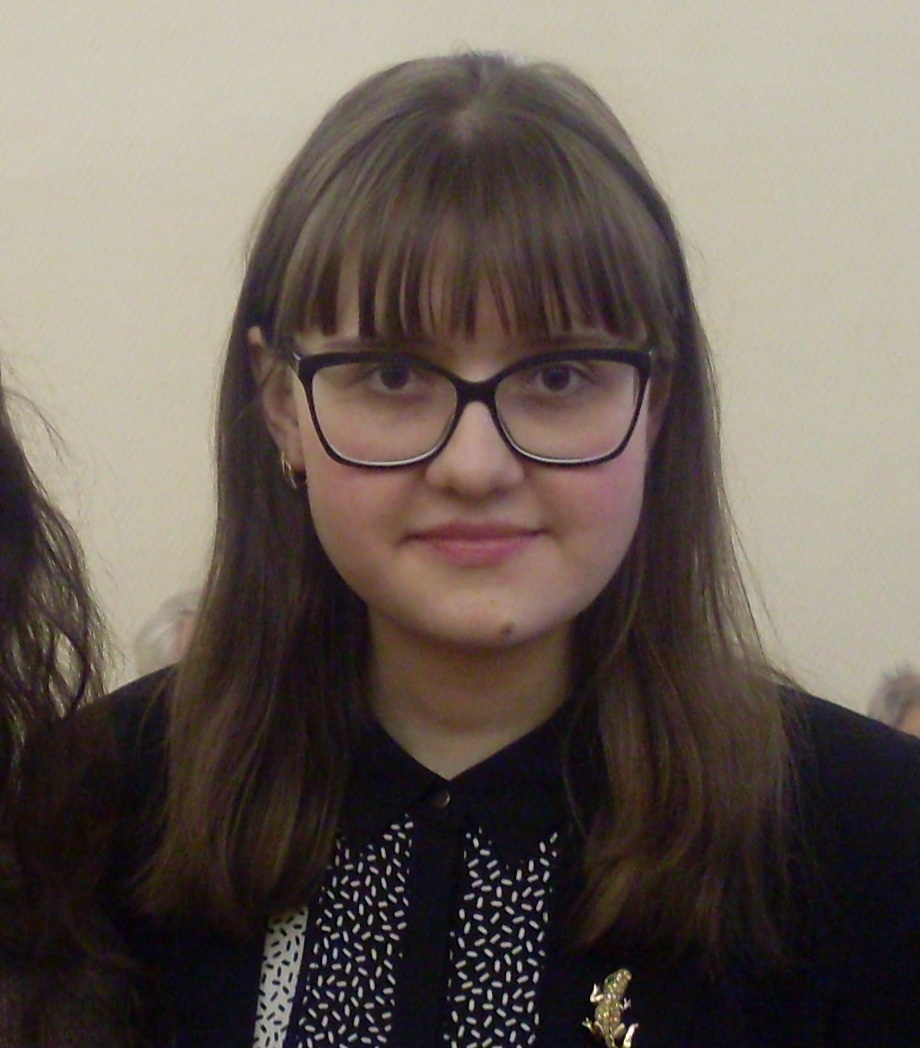| |

|
|

Researcher ID: U-8952-2018
 https://orcid.org/0000-0002-6674-5916 https://orcid.org/0000-0002-6674-5916
|
Education
2009 – Lomonosov Moscow State University, Faculty of Philosophy.
Academic Degrees
December 2013 – Ph.D. in Philosophy, Dissertation “Personal Knowledge as a Problem of Epistemology”, The Institute of Philosophy, Russian Academy of Sciences.
Fields of research
Philosophy of Creativity, Epistemology, Philosophical Anthropology, Philosophy of Mind, Cognitive Sciences
Professional appointments
- 2016–2019 – Junior Research Fellow, The Institute of Philosophy, Russian Academy of Sciences.
- Since 2019 – Research Fellow, The Institute of Philosophy, Russian Academy of Sciences.
|
| Research projects |
- 2020–2022 – “Contemporary Trends in Human and Social Sciences’ Development in the Context of Digitization Processes and the New Social Challenges: Interdisciplinary Approach” (№ 075-15-2020-798) –collective project.
- 2013–2015 – “Phenomenology of Meaning: Cognitive Analysis”(Russian Foundation for Humanities№13-03-00122а) – collective project.
- 2011–2013 –“Innovative Complexity: Methodological, Cognitive and Social Aspects” (Russian Foundation for Humanities-Byelorussian Foundation for Basic Research № 11-23-01005 “a(m)”) – collective project.
|
| International Scientific Participation: |
- International scientific conference “Social Anthropology: Integration of Sciences”. Moscow, October, 12, 2017.
- International student, postgraduate and young scientist conference “Lomonosov-2011”. Moscow, April, 11–15, 2011.
- International scientific conference “Human Being is an Object and Subject of Global Processes”. Saint-Petersburg, November, 19–21, 2009.
- International scientific congress “Globalistics-2009: Ways of Surmounting of Global Crisis and Models fof a New World Order”. Moscow, May, 20–23, 2009.
|
| Another Scientific Participation: |
- III Russian Aesthetical Congress. Vladimir, May, 18–20, 2023. Vladimir State University named after Alexander and Nikolay Stoletovs.
- Roundtable “Subjectivity of Creativity: Towards the Sources of Creative Meaning-Constitution Process”. Moscow, April, 25, 2023. Institute of Philosophy, Russian Academy of Sciences.
- VIII Russian Philosophical Congress. Moscow, May, 26–28, 2022.
- Roundtable “In The Institute of Philosophy, Russian Academy of SciencesMemory of Anatoly Stepanovich Maidanov”. Moscow, April, 4, 2022. Institute of Philosophy, Russian Academy of Sciences.
- Roundtable “Theories of Creativity: Integrity in Diversity”. Moscow, April, 12, 2021. Institute of Philosophy, Russian Academy of Sciences.
- The Second All-Russian Scientific conference “Philosophy of Creativity”. Moscow, April, 11, 2019. Institute of Philosophy, Russian Academy of Sciences.
- The First All-Russian Scientific conference “Philosophy of Creativity”. Moscow, April, 8–9, 2015. Institute of Philosophy, Russian Academy of Sciences.
- The 5th Annual scientific-practical conference “Philosophical Problems of Biology and Medicine: Normative and Descriptive”. Moscow, October, 26–27, 2011.
|
| Publications |
Books
- Gorelov A.A., Filipenok S.A., Yaroslavtseva E.I. Creativity, Human Being, Science. M.: IPH RAS, 2018. – 101 p.
Research Articles in Journals
2023
- Filipenok S.A. Tacit Knowledge in Digital Humanitaristics // Voprosy filosofii. 2023. Vol. 9. Pp. 103–113. DOI: 10.21146/0042-8744-2023-9-103-113
2019
- Filipenok S.A. Review: Morkina J. Poetic Creativity: Philosophical Analysis. Moscow: Kanon+ ROOI “Reabilitatsiya”, 2017 // Philosophy of Science and Technology (Filosofija nauki i tehniki). Moscow, 2019. Vol. 24. No 2. Pp. 159–167. DOI: 10.21146/2413-9084-2019-24-1-159-167.
2013
- Filipenok S.A. M. Polanyi`s Concept of Personal Knowledge in Modern Philosophical Problems: New Epistemological Approaches // TSPU Bulletin. 2013. 5(133). Pp. 92–98.
2012
- Filipenok S.A. Personal Knowledge and Personal Experience in the Process of Self-Consciousness // Philosophy and Culture. 2012. № 11(59). Pp. 109–119.
Contribution to Research Books Published
2022
- Filipenok S.A. The Relationship of History of Science, Logic of Science and Psychology of Scientific Creativity: B.M. Kedrov`s Conception Analysis // Philosophy of Creativity. Issue 8. Philosophical and Methodological Analysis of Creativity Processes / Ed. by N.M. Smirnova, I.A. Beskova. M.: Golos, 2022. Pp. 219–228.
- Filipenok S.A. Scientific Creativity as Holistic Process: A.S. Maidanov`s Conception Analysis // Philosophy of Creativity. Issue 8. Philosophical and Methodological Analysis of Creativity Processes / Ed. by N.M. Smirnova, I.A. Beskova. M.: Golos, 2022. Pp. 54–60.
- Polanyi M. Personal Knowledge. Towards a Post-Critical Philosophy. Part IV: Knowing and Being. Ch. 12: Knowing Life (1–2) (translated from English into Russian by S.A. Filipenok) // Philosophy of Creativity. Issue 8. Philosophical and Methodological Analysis of Creativity Processes / Ed. by N.M. Smirnova, I.A. Beskova. M.: Golos, 2022. Pp. 326–343.
2021
- Filipenok S.A. Tacit Self-Consciousness as a Factor of Creative Activity // Philosophy of Creativity. Issue 7. Philosophical and Methodological Analysis of Creativity Cognitive Foundations / Ed. by N.M. Smirnova, I.A. Beskova. M.: Golos, 2021. Pp. 208–221.
- Filipenok S.A. Meaningful Structures Formation in Individual Consciousness as Cognitive Basis of Creativity (M. Polanyi`s Conception Analysis) // Philosophy of Creativity. Issue 7. Philosophical and Methodological Analysis of Creativity Cognitive Foundations / Ed. by N.M. Smirnova, I.A. Beskova. M.: Golos, 2021. Pp. 320-325.
2020
- Polanyi M. Personal Knowledge. Towards a Post-Critical Philosophy. Part IV: Knowing and Being. Ch. 11: The Logic of Achievement (5–7) (translated from English into Russian by S.A. Filipenok) // Philosophy of Creativity. Issue 6. Philosophical and Methodological Analysis of Creativity`s Processes / Ed. by N.M. Smirnova, I.A. Beskova. M.: Golos, 2020. Pp. 282–311.
2019
- Filipenok S.A. Meaningful Gestalt Formation as a Creative Process // Philosophy of Creativity. Issue 5. Meaningful Dimensions of the Sociocultural Spaces of Creativity / Ed. by N.M. Smirnova, I.A. Beskova. M.: IIntell, 2019. Pp. 62–72.
2018
- Polanyi M. Personal Knowledge. Towards a Post-Critical Philosophy. Part IV: Knowing and Being. 11. The Logic of Achievement (1-4) (translated from English into Russian by S.A. Filipenok) // Philosophy of Creativity. Issue 4. Images of Creativity in Variety of Socio-Cultural Ptactices / Ed. by N.M. Smirnova, I.A. Beskova. M.: IIntell, 2018. Pp. 402–416.
2017
- Filipenok S.A. Construction of Personal Meanings as Basis of Creativity // Philosophy of Creativity. Issue 3. Creativity and World Life of Human / Edited by N.M. Smirnova, I.A. Beskova. M.: IIntell, 2017. Pp. 238–254.
- Filipenok S.A. Anthropological Discourse as Reflection of Culture // Social Anthropology: Integration of Sciences. M.: FGBOU VO “REU im. G.V. Plekhanova”, 2017. Pp. 158–162.
2016
- Filipenok S.A. Personal Knowledge as a Factor of Scientific Creativity // Philosophy of Creativity. Issue 2. Cognitive and Sociocultural Dimensions / Ed. by N.M. Smirnova, A.S. Maidanov. M.: IInteLL, 2016. Pp. 196–204.
- Filipenok S.A. The complexity of a Personal Experience // Innovative Complexity. SPb.: Aletheia, 2016. Pp. 333–354;
2015
- Filipenok S.A. The Personal Knowledge and the Creation // Philosophy of Creativity. M.: IIntell, 2015. Pp 305–311;
2013
- Filipenok S.A. The Personal Experience in the Creative Process. The Epistemological Analysis // Epistemology of Creativity. M.: Canon+, 2013. Pp. 272–288.
2012
-
Filipenok S.A. Personal Knowledge and Personal Experience in the Process of Self-Consciousness // Philosophy and Culture. 2012. № 11 (59). Pp. 109–119.
-
Filipenok S.A. Notion of Personal Knowledge in Jean Piaget`s Conception // Evolutionary Epistemology: the Modern Discussions and Trends. M.: IPH RAS, 2012. Pp. 137–151.
2011
|
| Main results |
The author has shown the role of personal knowledge and personal meanings in creativity. The conclusion has been substantiated that any individual creativity presupposes integration of particular components of personal experience into a new meaningful gestalt. Cognitive mechanisms, which regulate the process of formation of meaningful structures during perception, have been described on the basis of microgenetic theory (H. Werner, F. Sander). It has been demonstrated that the creative potential of the cognizing person, his/her ability to categorize the internal experience, to generate new meaningful structures in consciousness are involved in elementary acts of perception. Personal creativity has been considered as the process of modification of “the interpretative framework”, by means of which the individual conceives himself/herself and the world around him/her. The Research Fellow has revealed that the transformation of cognitive structures that occurs throughout a person’s life ensures the unity of self-creation, directed at the subject himself/herself, and his/her creative activity, the product of which are the artifacts of culture.
S. Filipenok has demonstrated that there is not only explicit self-consciousness but there is also tacit, implicit self-consciousness in the structure of consciousness. Tacit self-consciousness embraces subsidiary components of personal experience which determine a person’s individuality. The primary mode of implicit self-consciousness is the awareness of embodied self which manifests itself during motor activity. The internal model of motor activity has been considered to be the basis of embodied self-consciousness. It has been shown that within phenomenological, transcendentalistic tradition self has been understood as pure condition of immediate subjective experience “from the first-person perspective”. It has been substantiated that unique content of personal experience should necessarily be taken into account for comprehension of the self`s role and covert self-consciousness in cognitive and creative activity. Tacit self-consciousness has been considered as one of the significant factors of individual`s creative activity.
The Research Fellow has been demonstrated that human corporality specifies tacit knowledge, which belongs to natural intelligence, by contrast to artificial intelligence. Corporal experience endows a person with creative potential that technical devices lack. It has been revealed that a computer cannot have the material basis that a human being as a biological organism possesses. This imposes limitations on artificial intelligence cognitive capabilities. The objectification of the tacit components of corporal experience in language can be considered as an important factor of creativity and cognition. The use of natural language by a person differs from the use of sign systems by artificial intelligence. The difference is that natural language is meaningful in the subjective experience context. It would be more correct to speak of sign structure transformation by a computer as information processing rather than knowledge production. AI information becomes knowledge by virtue of interpretation, endowing it with human meaning. Unlike digital devices, human intelligence is analogue since it expresses a continuous stream of consciousness, an ongoing process of subjective meanings modification. The modern 4E-Cognition approach elicited the specifics of artificial intelligence and its cognitive limitations. The characteristics described within this approach are only partially applicable to artificial intelligence.
|
| E-mail: |
Stanafil@mail.ru |
|



